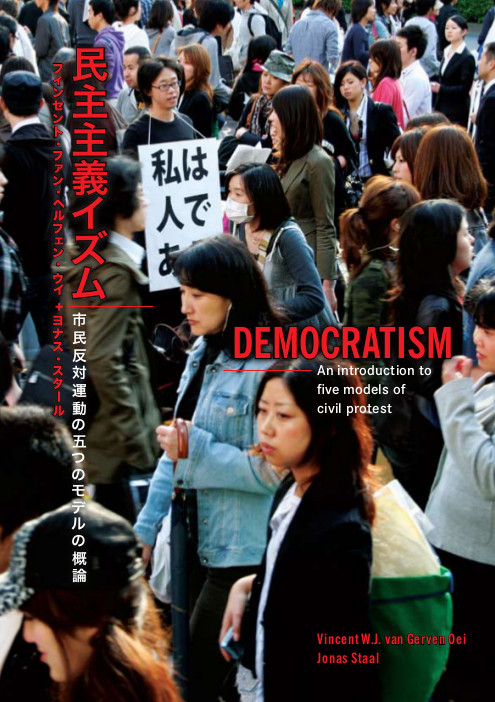Vincent W.J. van Gerven Oei, Jonas Staal: Democratism: An Introduction to Five Models of Civil Protest (2009) [English/Japanese]
Filed under booklet | Tags: · art, democracy, democratism, protest

Five individual reenactments of more and less known historical protests from the western world, in which all slogans have been translated into Japanese. The selection of the actions was based on the measure in which they were able to reflect on their own form of appearance. The actions were performed by several Japanese performers, who were also handing out flyers containing a short description of the performance and documentation of the original protest. Thus, the work formulated a critique on the institutionalized western mass protests as well a reflection on the state of democratism as is was implemented in Japanese society,
video interview with the authors
Democratism and the Institution We Call the Artist (2011, Jonas Staal’s debate in reponse to the essay “Politics of Art: Contemporary Art and the Transition to Postdemocracy” by Hito Steyerl, Art Brussels, published in Noordkaap Magazine
Translations by Yoshie Irie, Midori Sakai, and Mai Kato
24 pages
PDF, PDF (updated on 2018-7-26)
Comment (0)Philip N. Howard: The Digital Origins of Dictatorship and Democracy: Information Technology and Political Islam (2010)
Filed under book | Tags: · 1990s, 2000s, censorship, democracy, internet, iran, islam, politics, technology

– First book to move beyond potential and hypothetical relationships between technology diffusion and democratic transitions to look at lived experiences for countries under study
– Draws on a statistical study that compares data trends across 74 Muslim countries between 1990 and 2008
– Addresses 2009 presidential elections in Iran
Around the developing world, political leaders face a dilemma: the very information and communication technologies that boost economic fortunes also undermine power structures. Globally, one in ten internet users is a Muslim living in a populous Muslim community. In these countries, young people are developing their political identities–including a transnational Muslim identity–online. In countries where political parties are illegal, the internet is the only infrastructure for democratic discourse. In others, digital technologies such as mobile phones and the internet have given key actors an information infrastructure that is independent of the state. And in countries with large Muslim communities, mobile phones and the internet are helping civil society build systems of political communication independent of the state and beyond easy manipulation by cultural or religious elites.
This book looks at the role that communications technologies play in advancing democratic transitions in Muslim countries. As such, its central question is whether technology holds the potential to substantially enhance democracy. Certainly, no democratic transition has occurred solely because of the internet. But, as Philip Howard argues, no democratic transition can occur today without the internet. According to Howard, the major (and perhaps only meaningful) forum for civic debate in most Muslim countries today is online. Activists both within diasporic communities and within authoritarian states, including Iran, Saudi Arabia and Pakistan, are the drivers of this debate, which centers around issues such as the interpretation of Islamic texts, gender roles, and security issues. Drawing upon material from interviews with telecommunications policy makers and activists in Azerbaijan, Egypt, Tajikistan and Tanzania and a comparative study of 74 countries with large Muslim populations, Howard demonstrates that these forums have been the means to organize activist movements that have lead to successful democratic insurgencies.
Publisher Oxford University Press, 2010
ISBN 0199736413, 9780199736416
285 pages
review (Evgeny Morozov)
PDF (updated on 2012-11-11)
Comment (0)Bent Flyvbjerg: Making Social Science Matter: Why Social Inquiry Fails and How It Can Succeed Again (2001)
Filed under book | Tags: · democracy, hermeneutics, philosophy, phronesis, research, science, social science, society, theory

Making Social Science Matter presents an exciting new approach to the social and behavioral sciences including theoretical argument, methodological guidelines, and examples of practical application. Why has social science failed in attempts to emulate natural science and produce normal theory? Bent Flyvbjerg argues that the strength of social sciences lies in its rich, reflexive analysis of values and power, essential to the social and economic development of any society. Richly informed, powerfully argued, and clearly written, this book opens up a new future for the social sciences. Its empowering message will make it required reading for students and academics across the social and behavioral sciences.
Publisher Cambridge University Press, 2001
ISBN 052177568X, 9780521775687
204 pages
wikipedia (Phronetic social science)
wikipedia (about the book)
publisher
google books
PDF (updated on 2012-7-29)
Comment (0)
